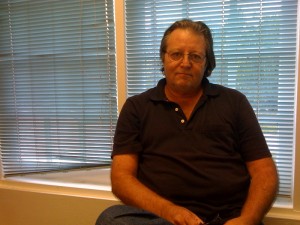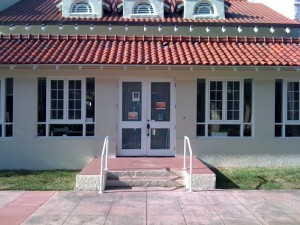
SoBe Institute Out to Build ‘Great Cultural City’
Carson Kievman in his office. (Photo by Greg Stepanich)
Carson Kievman never thought he’d be running an arts school.
But one request to find a violin teacher for a friend ultimately led to music teachers and students using his Miami Beach apartment for lessons, and before too long, he was renting out a studio apartment in his building and calling it the SoBe Music Institute.
Now that’s grown into the SoBe Institute of the Arts, and nearly four years on, Kievman says he’s optimistic that his operation can help Miami become the arts center it wants to be.
Kievman, a composer with nine operas and four symphonies to his credit who worked for years as a composer for Joseph Papp’s Shakespeare Festival/Public Theater in New York, said quality education in the arts is crucial to making that happen.
“You really can’t have an arts district, an arts city, without high-level arts education. It’s imperative, it’s the center. It’s where everything happens. It’s not only where people learn, where people come to learn, great artists work there. It’s the center of any great city,” he said.
“I’ve had 35 years of experience in the arts, and my area is multidisciplinary. I’ve worked in theater, I’ve worked in music, I’ve worked in all the arts. And I thought: I may be the right person to do this,” said Kievman, who also was the Florida Philharmonic’s composer in residence.

The SoBe Institute of the Arts. (Photo by Greg Stepanich)
Today, the SoBe Institute of the Arts works out of the Carl Fisher Clubhouse on Miami Beach, built in 1915 and the oldest standing building in the city. The Institute has a budget of about $250,000 and has about 200 students, he said.
I had a good conversation with Kievman, 59, in his office Tuesday afternoon, and he told me that his plan has been to build the institute from the ground up, drawing on community need and demand first, rather than imposing it on the community from somewhere else.
That will help the institute grow on a solid basis as the arts scene gets better, he said.
“What people are willing to accept here as being OK, would not be acceptable in almost any other major cultural city. And the reason is, when you’re not exposed to greatness, you don’t know the difference,” he said. “Miami has been trying for so long to call themselves a cultural city. It’s not enough to just call yourself a cultural city, it’s not enough to just build big edifices in the sky. You have to have the content.
“And not just any content, but high-level, world-class content, to say that you are in fact a world-class cultural city.”
The recession has made things tighter from a financial point of view for the institute, and next week it’s holding a fund-raiser to raise more interest in its work.

The Elizabethan England-themed event, called Bohemian Pentameter, is set for the night of Nov. 17, and will allow patrons to walk the grounds of the SoBe Institute on 21st Street and Washington Avenue amid musicians playing Renaissance pieces and actors wearing period clothes. There will be food from Epicure and Sardinia, and because it’s South Beach, there will be fashion, too, as models show off togs from Calypso Bal Harbour.
The event is being sponsored by WLRN and SocialMiami.com, and it’s all about building a better cultural future for this part of South Florida, he says.
“The thing about Miami and Miami Beach is that the potential is there. It’s screaming out, and that’s because there are so many good things going on,” Kievman said. “I think it will ultimately get there, if we succeed and others who are trying to do similar things succeed. I think it will become a great cultural city.”